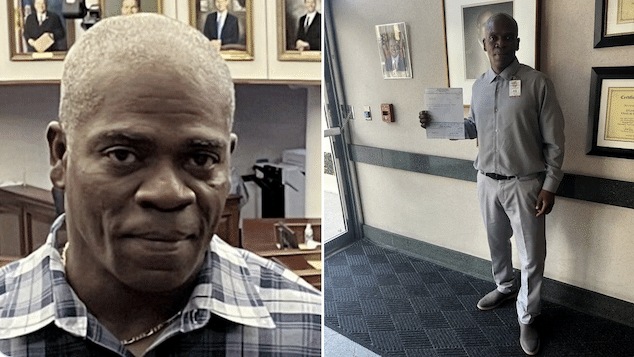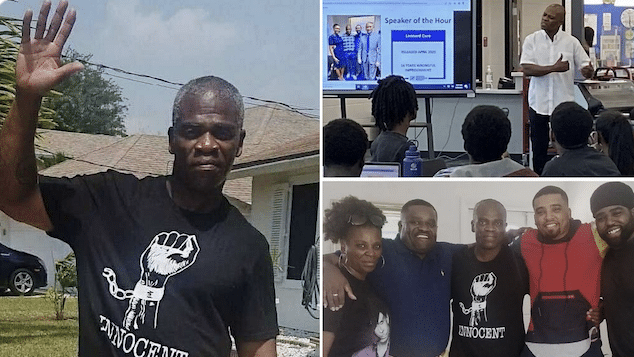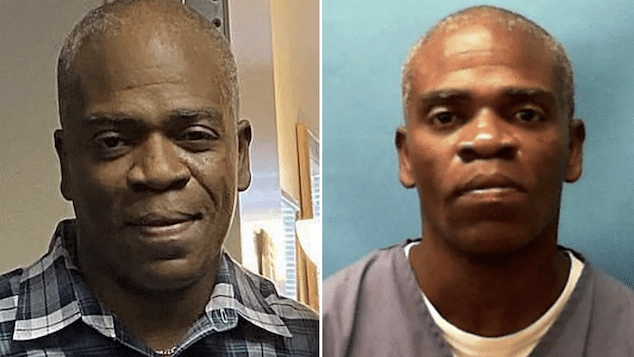
Leonard Cure exonerated black man who spent 16 years in jail on wrongful conviction shot dead by Georgia deputy during traffic stop as questions are asked.
Define fate? A Florida black man who served more than 16 years in prison on a wrongful armed robbery conviction was shot dead by a sheriff’s deputy during a traffic stop in Georgia as he was driving to visit his mother, authorities said.
Leonard Allen Cure, 53, had been out of prison for three and a half years following his exoneration when he was pulled over for speeding on Interstate 95 in Camden County early Monday, according to a news release from the Georgia Bureau of Investigation.
Cure was allegedly doing at least 90 mph in a 70-mph zone, the New York Times reported, citing a sheriff’s department spokesperson.
Fearful of authority that had stolen his life
Cure got out of his car at the deputy’s request and initially cooperated, but became violent after he was told he was being arrested, according to the GBI statement.
The deputy used a Taser and a baton on Cure in a bid to subdue him after the man began assaulting him, according to the agency.
After Cure refused to comply with his commands and continued resisting, the deputy drew his gun and opened fire.
Paramedics were called to the scene and tried to save Cure’s life, but he later died.
The deputy who shot and killed Cure has not been identified, save that he was a white man. It remained unclear whether race played any role in the incident, which is being investigated by the GBI. The deputy has since been placed on administrative leave.
It was unclear whether body camera footage of the traffic stop existed or if it would be released.
Cure had been represented in his exoneration case by the Innocence Project of Florida, which put out a statement Monday mourning his loss.
‘We are devastated by the news that our client, Leonard Cure, was tragically shot to death this morning,’ it said, adding that he had a job, was in the process of buying a home and dreamed of attending college to study music production.
‘When he left his mother’s house, he told her ‘I love you and I’ll be back to see you,” the statement continued.
Failed by the system
Cure was convicted of a 2003 armed robbery of a Walgreens pharmacy in Dania Beach, Florida. His conviction came from a second jury after the first one deadlocked.
Cure was sentenced to life in prison because he had previous convictions for robbery and other crimes.
In December 2019, Cure asked a newly created Broward State Attorney’s Office Conviction Review Unit to reinvestigate his case, based on evidence and questions about how he was identified as a suspect in the robbery.
A few months later, the Review Unit petitioned a judge to release Cure from prison, saying it unearthed ‘troubling’ revelations that the man had solid alibis that were previously ignored and no physical evidence or credible witnesses to put him at the scene.
An independent review panel made up of five lawyers agreed, ruling that the case against Cure gave ‘rise to a reasonable doubt as to his culpability and that he is most likely innocent,’ according to court records.
A judge vacated Cure’s convictions and sentence, with all charges dropped against him three days later, making him the first inmate to be exonerated by Broward’s review unit.
‘I’m looking forward to putting this situation behind me and moving on with my life,’ Cure told the Sun Sentinel at the time.

Structural racism
In August of this year, Cure, who lived in suburban Atlanta, received $817,000 in compensation for his wrongful conviction and imprisonment, which Florida Gov. Ron DeSantis had green-lit in June.
The Innocence Project of Florida’s executive director, Seth Miller, said he learned of Cure’s death from his family.
‘I can only imagine what it’s like to know your son is innocent and watch him be sentenced to life in prison, to be exonerated and … then be told that once he’s been freed, he’s been shot dead,’ Miller said.
Its now being speculated, trauma and confrontation with a police officer may have set the man off.
For those who have been freed after a wrongful conviction, the sight of a police officer and the threat of arrest can trigger a post-traumatic response, said Stephanie Spurgeon, a Pinellas County, Florida woman who spent eight years in prison for manslaughter because of expert witness testimony that was later shown to be faulty.
‘It’s a feeling that’s hard to articulate,’ Spurgeon told the Sun Sentinel. ‘Even having a police officer pull up behind you without the lights flashing awakens trauma. Panic. Terror. Absolute fear. And a sense that this can’t possibly be happening again.’
Broward State Attorney Harold Pryor praised Cure as ‘a smart, funny and kind person.’
‘After he was freed and exonerated by our office, he visited prosecutors at our office and participated in training to help our staff do their jobs in the fairest and most thorough way possible,’ Pryor said in a statement to the Sun Sentinel.
Studies show Black Americans face a disproportionate risk of being wrongfully convicted of crimes or killed by police.
Black people make up 13.6% of the American population but 53% of the 3,200 exonerations listed in the National Registry of Exonerations, according to a 2022 report by the registry.
Black Americans are seven times more likely than white Americans to be falsely convicted of serious crimes, the report said.
For those whose convictions are overturned, exoneration is often not a happy ending. Many struggle with severe PTSD following their wrongful conviction, which psychologists have often compared to the trauma experienced by war veterans.







